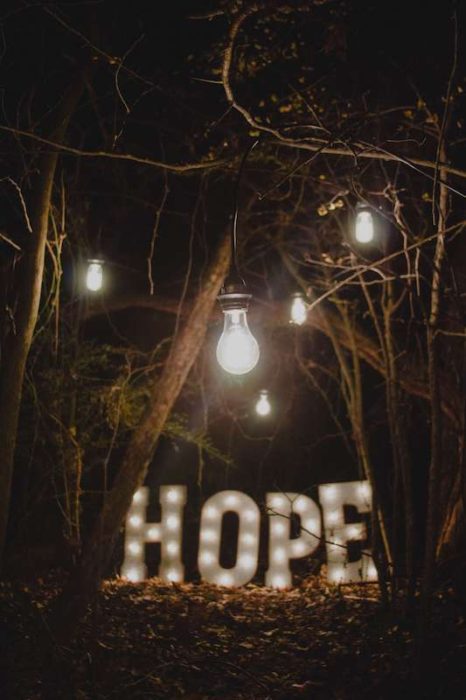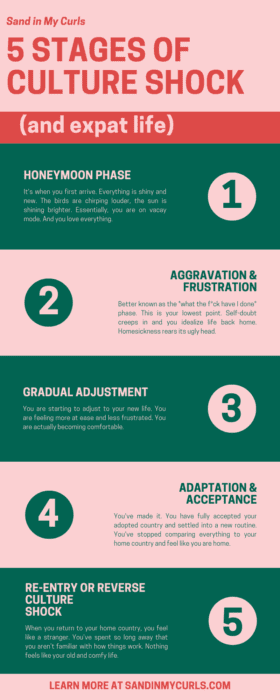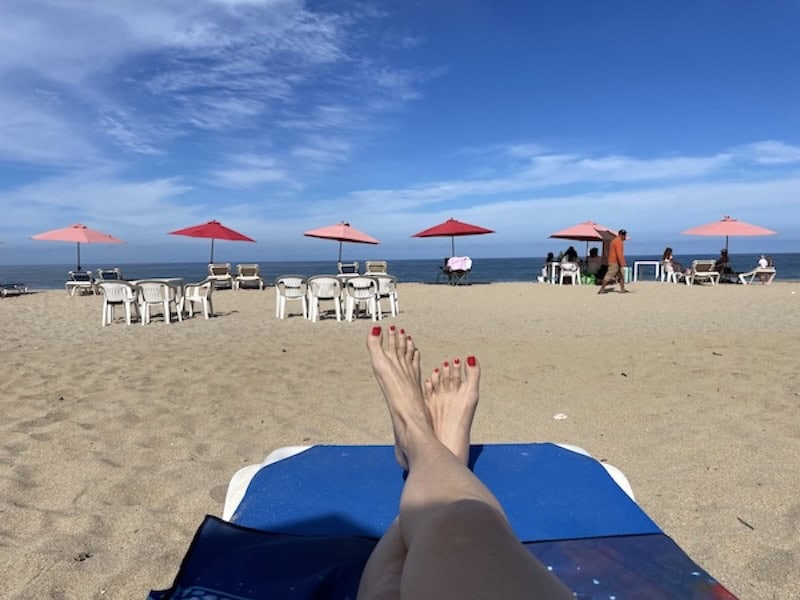Last Updated on November 7, 2023 by Kirsten Raccuia
Did you know there were actual stages of culture shock? No? Me neither. And I have a degree in cultural anthropology. So that’s embarrassing. Clearly, I’ve forgotten more than I remembered from my hazy college days.
Anywhoooo, so yeah. 5 stages of culture shock- they’re a thing. Even Wikipedia has a page dedicated to them.
I’ve always thought of culture shock as something that happens for a brief moment in time. Lost in Translation style. I never thought of culture shock as something that could stay with you.
And the more I read about it, the more I realized it has nothing to do with what I associated with culture shock. But call it what you will, those five stages are precisely the highs and lows of the expat journey.
So, let’s get to the nitty-gritty of all this culture shock stuff and how it is a significant part of expat life.
First of all, what is culture shock?
The actual definition of culture shock by dictionary.com is the feeling of disorientation experienced by someone when they are suddenly subjected to an unfamiliar culture, way of life, or set of attitudes.
What are the 5 stages of culture shock?
- The Honeymoon Stage
- Aggravation & frustration
- Gradual adjustment
- Adaptation & acceptance
- Re-entry or reverse culture shock
1. The Honeymoon Stage: The First Stage of Culture Shock

Oooh, this phase is a goodun. Ya know when you travel somewhere new, and everything is better and more colorful? Even the sun seems to shine brighter, the sky is bluer, the clouds are fluffier.
Everything is new and exciting. During this stage, you are still on vacation.
You are in love, my friends. It’s all new and shiny and beautifully foreign.
And besides, this shiny new country that is now your home needs a lot of attention. You’ve got a lot to do. You have to find a new place to live, figure out transportation, get yourself situated, sort out work. You have no time to feel anything but busy excitement.
You are enraptured by the novelty of your new life.
How to Deal with Stage 1
Enjoy every damn minute of it! The honeymoon phase of culture shock is pure magic.
2. The Aggravation & Frustration Phase: The Second Stage of Culture Shock

While it might be known as the aggravation & frustration phase, I like to call this the what the f*ck have I done phase?
The honeymoon is over, and reality is sinking in. It’s the rock bottom stage. You had to see that coming, right?
This is when some aggravation and frustration start creeping in. You might feel confused and irritated.
Things start going wrong, and you begin comparing your new country to your old one. You are annoyed by the differences. You start thinking things like it would be so much better if they did _______ as they do back home.
This phase is incredibly difficult if there is a language barrier, and you can’t communicate easily. Little things could frustrate you, and small misunderstandings might cause tremendous stress. And everyday tasks feel monumental.
Homesickness kicks in full throttle, and self-doubt rears its ugly head. You might start to idealize the life you lived back home, forgetting all the reasons you left. You’re probably going to ask yourself, “What the f*ck have I done? Why the hell have I moved to this country?”
How to Deal with Stage 2
It might be tempting to isolate and retreat. But that is the worst thing you can do.
You need to meet people. Seek out other expats, they’ve been through it before, so it will be comforting to hear how they got passed this phase.
Take some language lessons. It’s a great way to meet people and learn about your new homeland.
Do things that remind you of home: cook something traditional, a comfort food, watch your fave movie set in your home country, watch travel shows about your home country. It’s ok to miss home, so don’t beat yourself up over it, but don’t sink in so far that you can’t see the beauty of your experience.
Take a step back and give yourself some grace. You just made a monumental decision and moved to another country. It’s crazy not to think that you’ll have some adjustments to make, some shit to go through.
Be kind to yourself.
And by all means, don’t give up. Do NOT book that plane trip home. You’ve got to tough it out. This too shall pass, I promise.
3. The Gradual Adjustment Stage of Culture Shock

Ok, time to pull yourself out of the rock bottom stage of culture shock. Phase three is where you dust yourself off a bit and get back up. You start to feel cultural adjustment to your new country. You’ve gotten your bearings.
Instead of hating the cultural differences, you get curious about the differences again, like you were in the honeymoon phase.
You feel more at ease and familiar with your surroundings, and you can communicate your needs a little better.
You have made some friends and created a new daily routine.
How to Deal with Stage 3
Since you on the upswing of the bell curve, you have good and bad days. Recognize that what you are feeling is not only normal but expected. Just ask your new friends.
Because you are learning the language, you are making some local friends, and they are teaching you the lay of the land.
Keep learning about the culture. Read books about your new country, not just guide books, but also those about the culture. I love reading historical fiction for this because it shows you a different side of life, one that you may never fully integrate with but can adapt to.
Even after living in Malaysia for seven years, I love reading books about Malaysia – and I learn so much from each and every one of them.
Also, remember to be a tourist. Just because you are living there doesn’t mean you can’t explore like a traveler. Go to the museums, learn some history, go to cultural events and festivals. Take it all in.
4. The Adaptation & Acceptance Stage of Culture Shock

In this stage of cultural shock, you are no longer unhappy with your new country. You’ve adapted. You are settling in. Sitting comfortably with your daily routine and getting out and about to meet new people regularly.
You have a circle of friends you hang out with, and when you meet newbies, you are proud to show them the ropes.
Phase four is where you’ll spend most of your time.
This stage doesn’t mean you won’t struggle or have rough days, but there are fewer. You are still learning to adapt and are ok with the learning process.
Acceptance
You’ve stopped comparing everything to your home country. And you recognize that your home culture isn’t better than your current one. It’s just different. You’ve accepted the differences and have grown to love some of them.
You may even start feeling like this is home. You are seeing the light again. You begin to accept your new atmosphere.
It’s not the euphoric feeling you had in the honeymoon stage, but this is your life, and you’re happy with it. You’ve welcomed it.
You miss home but don’t want to go home. That is a major accomplishment.
You can’t force this phase. It just happens. One day you feel frustrated and annoyed, and the next, you are rolling with the punches. One day you are scared to drive; the next, you’re blowing red lights and driving the wrong way on a one way, just like the locals. It happens, people. I swear.
How to Deal with Stage 4
Lean in. It’s time to enjoy the high and recognize that the lows don’t stick around forever. Start making more friends, reaching out, learning new things.
Take it all with stride. There were highs and lows back home, so why should your new life be any different?
5. Re-entry or Reverse Culture Shock

I feel this stage of culture shock every time I go back to the US now.
Malaysia and Southeast Asian culture as a whole has imprinted on us. When we visit Chicago and Connecticut, everything is new to us again. We’ve spent so long away that we aren’t familiar with how things work anymore.
Everything that was once old is now new again.
Your friends haven’t changed in the ways you have – it’s not a dig on them. It just is. People move on without you. They have to.
Let’s be real, you’ve lived in another part of the world for a couple of years. During that time, your friend’s lives have continued on as usual. Meanwhile, you have had to relearn everything about your new world and, in doing so, about yourself as well. It is inevitable.
The longer you are away, the harder it might be to keep that old connection. It doesn’t mean you will lose your friends; it just means a shift in the relationship. There is a bit of a chasm.
They haven’t experienced your journey, so it’s hard to relate. But the same happens in reverse. Your friends are all still hanging out, having babies, going to the bars, whatever their daily life consists of. Their lives have changed in a different way than yours. You are no longer living parallel lives on the same path.
Which one is worse – culture shock or reverse culture shock?
It’s a good question that I can’t fully answer.
Obviously, I haven’t moved back to the US, but all of my friends who have repatriated found it extremely difficult to get back into the groove. Far more so than moving to a completely new country.
I think that makes sense. Everything is fresh when you move to a new place. You get to create the life you want.
When you return home, everything should feel old and comfortable, like putting on your fave jammies or slippers. Except it doesn’t. Nothing feels like your old and comfy life. Those jammy-jams don’t fit anymore. They’ve shrunk and gone right up your butt.
And so the quest for starting over, in that once familiar place, begins all over again.
How to Deal with Stage 5
Honestly, you just have to deal with it, especially if you are only visiting.
However, if you are moving back, you will probably go through these stages all over again. It sucks.
The 5 Stages of Culture Shock Round-Up

Is it possible to not experience culture shock? No, not really. You’d have to live in a bubble to do that. It is inevitable. You might not even know you are having culture shock symptoms until you look back.
It is an integral part of the highs and lows of the living abroad journey. However, knowing these culture shock stages will help you recognize you aren’t alone. It’s only natural to feel this way.
Not everyone feels all the stages. Some are more dramatic than others, some only last a short time, some never recognize it. But we all experience some of them and some point.
Now hold your horses; just because you’re feeling like a Grumpy-Gus doesn’t mean you are experiencing one of the stages of culture shock. You just might be in an asshole phase.
It happens.
But if you take a deeper look, you might recognize that you are, in fact, in one of those phases of culture shock. At least you have something to blame it on then, right?
Friends, travelers, expats, how have you experienced culture shock? What was your most challenging cultural shock moment? Tell me in the comments below. Share your stories.
The 5 Stages of Culture Shock Infographic
Learn better with visuals? I’ve got you covered. I created this infographic of the 5 stages of culture shock to summarize everything and put it one place. Do you like it? Want me to create more of these?

Like this post? Or TL;DR? Then PIN IT!




Try moving to LA. You never leave stage two. I lived in 19 different cities. I’ve experience these stages ina different way. LA is different.
Hi Larry,
Oh no! Stuck in LA and stage 2! That sucks. Where are you from originally?
I’m originally from Philly. Somehow 19 was a typeo. It should read 10 different cities. Chicago being one of them. I love Chicago except the deep winters. P. S. I am the Larry you and Mark know from Chicago. Yes, it is not a happy place to be in stage 2. Trying my best to get to 4 ASAP.
Larry B! What a great surprise! I didn’t know you moved to LA! I wish you all the luck out there and hope you can get out of stage 2 quickly. How long have you been there?
Hi Kristen, we’ve been here 15 months. We are usually quick at adjusting. Not sure why, perhaps it’s this COVID deal. I hope you and Mark are well. I enjoy reading your blog posts.
Hi LarryB!,
15 months isn’t that long. Moving is hard at any time, but especially now when the world is upside down, it’s a whole new ballgame. Everything is much more challenging. HAve some patience and keep at it. At least you won’t have shovel snow this winter!
Sorry for the misspelling. Autocorrect got me.
Thanks for the encouragement. Living in a non winter area is agreeable with us. We are trying our best to move forward. Photography has kept my mind occupied when not working.
Hi to Mark.
Ha! Larry, I know you are well aware of my name! I figured it was that damn autocorrect!
Mark sends Hi’s back to you!
Hugs!
K
Hi Kirsten, it’s mom. I loved your article as always and I knew that you would have many adjustments when you moved. However when you left us here in the US, I experienced all those stages only in A different way for me the hardest stage was acceptance. I did not grieve because you were not lost to me. But over the years I have learned to except the fact that you and Mark are so very happy there in Penang. And coming to visit has helped me to understand why you love your life there’s so much. Hopefully when all this mess is over we will get to see each other again. That’s what I miss most of all, just hugging you.
Hi Momma! I’m crying! You are the most supportive wonderful woman ever. I know our decision affected you intensely as well. I’m working on a way to spend more time on that side of the globe. Not in the US but somewhere much closer and easier to see you.
I can’t wait to see you again soon. Love you!
Me to you sweetheart
Great article! It reminds me of when Ed & I went back to the US from Saudi Arabia & I was so miserable with the reverse culture shock that we actually thought about going back on a “married contract “ 😢🤣🤣 We are still in phase 4 of adjustment here in Vietnam 🙏👏👏
Hi Sally!
Thank you. Reverse culture shock is a real thing! I have no intentions of moving back to the US but think it would be an interesting segment of my expat interview stories.
Glad you are in stage 4 in Vietnam. Can’t wait to see your life there one day soon.
Excellent thoughts and expression as usual Kirsten. I find( like the stages of grief) I tend to revisit certain stages in varying degrees. The honeymoon phase lasted a long time for us but the frustrations have been there in many different forms from the start.. some days I just cope better with the irritations. This year has been challenging because our life here was predicated on the assumption that we could go back twice a year to see family and that kept me grounded. Without that option in 2020 it has made home a little more appealing but we have both discussed this and figured…if we went back to Australia we would never have this lifestyle and we would miss all our friends. So for now we just roll with the punches!
Hi Chele,
Thank you.
It is so true that some days it’s easier to handle the daily BS. It’s fun revisiting the honeymoon phase by going into Georgetown and staying at a cute hotel. It’s short-lived but brings back all the things I’ve always loved about GT.
Yep, this year has royally sucked and has pulled my heart nearer to the US as well. Not sure how to balance that but for now, we are here with you rolling with the punches.
I always look forward to your articles Kirsten 🤗
I recall about two years ago when Mike and I had landed back in Penang and we were in a grab heading to our apartment when Mike commented that coming back here was like putting on an old comfy tshirt….. enough said. Obviously stage 4.
Thank you so much, Heather. I love that! What a great feeling to have in your adopted home!
Perfectly articulated Kirsten. I’ve experienced this process 3 times now over 15 years, having moved to Dubai, then Singapore and now Penang. Many visits back to Oz along the journey.
I make the most of every new home country but it’s certainly not easy, with all the visa paperwork, understanding the local culture and finding my ‘community’.
For me it seems to take a year or more to feel settled and make new real friends. I’ve experienced anxiety and depression along the way, especially in the early stages.
I can happily say today though, I love living in Penang and wouldn’t want to live anywhere else right now.
Hi Susie,
Thanks for being here!
It’s great to hear you are so happy here. We are as well. However, it isn’t all roses as you know and it takes time to adjust to any new surroundings. The highs and the lows of expat life are very real!
Thanks for commenting!
I think these are similar to the Grief cycle.
I think one of the best ways to minimize the trauma is to prepare yourself even before you go over. Research, research, research. Then open your mind and heart way, way up so you can be ready for whatever happens.
I’m on my 4th overseas adventure and it does get easier each time, but each place has its own challenges that you have to work through.
Another great article Kirsten, thanks!
Hi Michael,
Thank you!
I agree. It’s all about research and keeping an open mind/heart. Being flexible helps as well.
Stay well.
K